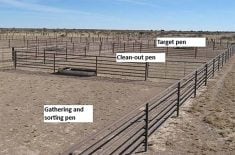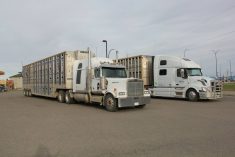NASHVILLE, Tenn. — New approaches are needed when talking to the public about farm animal welfare, those attending a cattle convention heard in February.
Branding, dehorning and confined housing seem cruel to urban dwellers, and too often the practices can’t be explained well. Producers also tend to defend their practices to each other and dismiss the consuming public as ignorant.
“When we talk to each other, we do it so effectively, we are damned sure we are right,” said Dave Daley, a cow-calf producer and professor of animal science at the University of California.
Read Also

New coal mine proposal met with old concerns
A smaller version of the previously rejected Grassy Mountain coal mine project in Crowsnest Pass is back on the table, and the Livingstone Landowners Group continues to voice concerns about the environmental risks.
“Our solution is to say it louder and say the same thing over and over again.”
Most of the public knows little about agriculture, but many seem to suspect that producers are probably doing something wrong, he told an animal health committee meeting at the National Cattlemen’s Beef Association convention held in Nashville Feb 1-4.
Too often, people are told animals are treated well because otherwise producers would not make any money. This makes them sound greedy.
For example, it is better when defending castration to urban residents to tell them that a calf will breed with its own mother and sisters if it isn’t castrated.
Daley said they can accept the incest explanation better than being told it makes the meat better and reduces behaviourial problems in the herd.
Wrong approach
Daley offered the following advice on how to lose an argument on farm animal welfare:
- assume science will provide all the answers. It does not solve ethical questions and the public does not understand or trust science. The public will listen to producers
- use economics as a justification for farm practices. It sounds greedy and uncaring
- try to defend all agricultural practices. Defend those that are defensible but the producer loses credibility when defending everything
- assume animal welfare cannot be improved. Agriculture practices are always evolving and improving. Things can be done differently and better
- attack everyone who disagrees. Sometimes it is better not to argue at all
- be unwilling to listen, especially to those with whom you disagree
- assume the lunatic fringe is the general public
- be reactive rather than proactive
- assume someone who disagrees with you is either stupid and/or evil. Good people can look at the same issue differently
- don’t work hard enough to form coalitions that include the general public
- mock or criticize non-conven-tional production systems such as grass fed, organic and natural beef. Let the market determine whether they succeed or fail
- try to lead a parade and not check to see if anyone is following


















